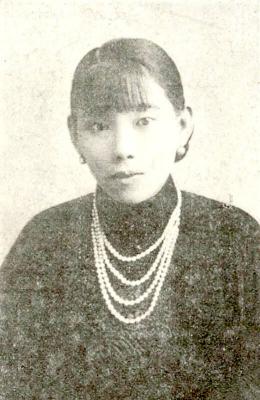Thunderous applause erupts as Hank (his English name is used to protect his identity) finishes a speech about contracting and living with AIDS. A young man - one of more than 400 in attendance - wends his way through the lecture hall to shake Hank's hand, then embraces him in a bear hug. Over by the stage, young women line up to have their picture taken hugging Regan Hofmann, a guest speaker.
Handshakes and hugs, let alone posing for photographs, is not the kind of response people with HIV/AIDS usually get in Taiwan. More often, they are shunned by their families, ignored by colleagues and branded as pariahs.
Hofmann - who contracted HIV eleven years ago through a heterosexual relationship - visited Taipei last week to promote HIV/AIDS awareness and show the disease threatens more than just the gay community or drug users.

ILLUSTRATED BY YUSHA
"Taiwan is lucky in that you are ahead of the [HIV/AIDS] epidemic," she said.
Compared with the estimated 1.4 million people infected with HIV in North America and 740,000 in Western Europe, the latest Center for Disease Control (CDC) figures put the number of Taiwanese living with HIV and AIDS at around 12,000.
Though this number is relatively low, a laissez-faire attitude towards condoms, the skyrocketing spreading of the disease among intravenous drug users (IDU), and discrimination, ignorance and fear - and the consequent reluctance of people to get tested - mean Taiwan is ripe for an HIV epidemic. If 12,000 seems like a small figure, CDC officials believe the number of HIV cases may actually be between two and five times higher because there is currently no national HIV/AIDS testing day in Taiwan.
"To make the data more clear, we need to run a campaign for HIV testing day," said Yen Muh-yong (顏慕庸), director of the Division of Disease Control and Prevention with Taipei's Department of Health.
Researchers say the sooner people are tested for the disease the greater control the medical community can exert in ensuring it doesn't spread. Early diagnosis of the disease can also help prolong the patient's life.
"Hofmann is the so-called non-risk group. But her story tells us that these groups should know that they too are at risk," Yen said.
According to CDC statistics, heterosexuals make up 23.9 percent of reported cases of HIV and 43.4 percent of those with AIDS, proving the popular assumption that it affects only the high-risk population is false.
"We notice that IDU has passed to the female group and the female group through prostitution to the heterosexual group to the baby group. If that keeps on growing than we will face heterosexuals [becoming] a general risk factor," he said.
KNOWLEDGE AND BEHAVIOR
HIV/AIDS education that actually changes behavior is the most important task in curbing a potential epidemic.
Yen says addicts in Taiwan know a lot about needle sharing and how to dispose of dirty syringes. But that knowledge is worthless if it doesn't affect behavior.
"After you become addicted you just want the drugs," he said.
Changing the behavior of addicts, Yen said, starts with changing the behavior of law enforcement. He said police used to bust addicts at needle exchange centers, pushing drug users underground and increasing the likelihood that addicts will use infected needles.
Though there have been positive changes in Taiwan over the past three years - police are strongly discouraged from arresting addicts at needle exchange centers - Yen says much work remains to be done.
"Taiwanese [are] a conservative people," he said. "We do not take sex education in our official class. It's in our textbooks [but it's not taught in the classroom]."
This is a sentiment echoed by Twu Shiing-jer (涂醒哲), former health minister and current Director of the Taiwan AIDS Foundation (台灣紅絲帶基金團).
"Many teachers don't know how to teach it [sex education]. So they have the students read about it by themselves," he said.
Considering HIV is increasingly a disease that affects the young, Yen says it's important safe sex education starts young age.
"We still face some difficulty trying to put condom machines in the school," he says.
Public officials are responding to parents' concerns that condom machines in high schools will encourage promiscuity. Oddly, many parents fear that raising awareness about the disease increases the likelihood of getting it.
CORPORATE SOCIAL RESPONSIBILITY
Such fears have filtered into the business community. Twu said many businesses refuse to support HIV/AIDS foundations or conduct in-house training because of the stigma surrounding the disease.
"Another reason is because if you put the money in people ask, 'Are you gay?'" he said.
At a recent HIV/AIDS summit held in Taipei, Anthony Pramualratana, executive director of the Thailand Business Coalition on AIDS, said the business and labor communities need to get involved.
Pramualratana's foundation works with Thailand's ministry of labor to provide courses on HIV/AIDS prevention and awareness. After taking the course, the company receives accreditation showing they are following proper labor standards. His foundation has so far accredited 4,111 companies in Thailand, covering more than 300,000 employees.
"Taiwan needs a champion, a champion who writes formal letters that say, 'You have to get involved here,'" he said.
Yen agreed, saying that putting a story like Hofmann's into the curriculum was really important, to show students the scope of the risk.
Having role models that people can relate to, such as former US basketball star Magic Johnson, is a necessary step that has already occurred in North America and Europe. Twu also suggests an NGO that messages between different foundations and organizations.
"In Malaysia they have 22 NGOs and there is [a] 23rd to integrate all the others," Two said.
Though the business community has been slow to get involved, there is no shortage of people giving money to the Harmony Home Association (關愛之家), a non-profit group that cares for people with HIV/AIDS.
The foundation's secretary general Nicole Yang (楊捷) says 85 percent of her funding comes from private donors and 15 percent comes from the government. But Yang says attitudes in Taiwan are changing slowly.
DISCRIMINATION STILL EXISTS
Yang cites the recent controversy in Taipei's' Wenshan District and another hospice her group operates in Kaohsiung - in which neighbors forced midway homes for HIV/AIDS patients to relocate - as examples of how communities in Taiwan still discriminate against people with the disease.
"They think that the people who have HIV/AIDS are drug users or gay people or the people who have a lot of sex [and] they are a high-risk population," she said.
Discrimination also remains an issue in the medical community.
"We have HIV/AIDS special clinics or what we call 'assigned centers' caring for HIV/AIDS [patients]," said Wong Wing-wai (王永衛), medical director of Taipei City's Consortium of Disease Control and executive secretary of the Drug Abuse Prevention Center (毒品危害防治中心).
The clinics provide services for everything from obstetrics to orthopedics to surgery, he said. Their purpose is to give patients the best possible care in a sympathetic environment. However, the policy has created a loophole for physicians who don't want to treat patients with HIV.
"They now have an excuse [to] refer the patient to [assigned centers] and have no obligation to care for the patient," Wong said.
Because changing adult perceptions is difficult, Yang focuses much of her considerable energy on educating Taiwan's youth in the public school system, giving lectures and seminars to students about the disease and how people get it.
"We bring AIDS patients and the children [with HIV/AIDS] to schools. It's very useful. It's basic education and it takes time for people to understand."
Yang said Harmony Home's appeal to schools caused her organization to change from a non-governmentally regulated volunteer organization to an officially recognized NGO back in 2004. Since then, schools throughout the island have called upon their services to educate students in large audiences about the disease. Her group has made presentations to 200,000 students throughout Taiwan, or an average of 75,000 students per year.
Hank is often a guest speaker at these lectures. He finds young students who, before the lecture begins, are afraid to approach him or children with HIV, will more often than not mob the stage to hug him after the lecture.

Many people noticed the flood of pro-China propaganda across a number of venues in recent weeks that looks like a coordinated assault on US Taiwan policy. It does look like an effort intended to influence the US before the meeting between US President Donald Trump and Chinese dictator Xi Jinping (習近平) over the weekend. Jennifer Kavanagh’s piece in the New York Times in September appears to be the opening strike of the current campaign. She followed up last week in the Lowy Interpreter, blaming the US for causing the PRC to escalate in the Philippines and Taiwan, saying that as

US President Donald Trump may have hoped for an impromptu talk with his old friend Kim Jong-un during a recent trip to Asia, but analysts say the increasingly emboldened North Korean despot had few good reasons to join the photo-op. Trump sent repeated overtures to Kim during his barnstorming tour of Asia, saying he was “100 percent” open to a meeting and even bucking decades of US policy by conceding that North Korea was “sort of a nuclear power.” But Pyongyang kept mum on the invitation, instead firing off missiles and sending its foreign minister to Russia and Belarus, with whom it

The Chinese Communist Party (CCP) has a dystopian, radical and dangerous conception of itself. Few are aware of this very fundamental difference between how they view power and how the rest of the world does. Even those of us who have lived in China sometimes fall back into the trap of viewing it through the lens of the power relationships common throughout the rest of the world, instead of understanding the CCP as it conceives of itself. Broadly speaking, the concepts of the people, race, culture, civilization, nation, government and religion are separate, though often overlapping and intertwined. A government

Nov. 3 to Nov. 9 In 1925, 18-year-old Huang Chin-chuan (黃金川) penned the following words: “When will the day of women’s equal rights arrive, so that my talents won’t drift away in the eastern stream?” These were the closing lines to her poem “Female Student” (女學生), which expressed her unwillingness to be confined to traditional female roles and her desire to study and explore the world. Born to a wealthy family on Nov. 5, 1907, Huang was able to study in Japan — a rare privilege for women in her time — and even made a name for herself in the